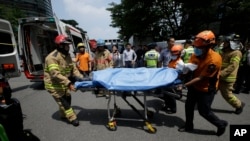South Korean protests against Japan's colonial rule took a violent turn Wednesday when an elderly man set himself on fire in front of the Japanese embassy.
The incident occurred during a weekly demonstration held to demand Japan apologize for its colonization of the Korean Peninsula and for compensation for forcing Korean “comfort women,” as they were called, to work in military brothels during World War Two.
It is estimated that more than 200,000 women from across Asia were forced to become comfort women for occupying Japanese soldiers during the war.
With the anniversary of Japan's surrender in the war approaching, the Seoul protest was larger than usual, with about 2,000 demonstrators, including three of the 47 surviving Korean comfort women.
Extinguished flames
Bystanders quickly extinguished the flames with banners and water. The man who lit himself on fire is reportedly still alive and was taken to a hospital for treatment.
The embassy protest was one of several high-profile events urging Japanese Prime Minister Shinzo Abe to apologize for Japan’s atrocities committed during World War Two.
Abe is expected to address this issue when he makes a public statement on the 70th anniversary of the end of WWII on August 15.
Former Japanese Prime Minister Yukio Hatoyama was in Seoul Tuesday to visit Seodaemun prison.
The prison is now a museum that commemorates the hundreds of independence activists who were incarcerated during Japan’s colonial rule over the Korean Peninsula from 1910 until 1945. Many anti-Japanese activists and resistance fighters were tortured and executed in the prison.
Hatoyama toured the prison facility, stopping in small cells the size of a closet where up to seven prisoners were forced to live.
Monument
He first placed flowers in front of a monument to those who died at the prison, then knelt on the ground in a sign of respect and humility.
Hatoyama is a member of the Democratic Party of Japan, the leading opposition party to Prime Minister Abe’s ruling Liberal Democratic Party.
Hatoyama said he did not come to Korea in any official capacity. Instead, as a former prime minister of Japan and a Japanese citizen, he apologized for his country’s past transgressions.
“I am standing with very heavy heart and would like to apologize from the bottom of my heart for the fact that Japan did something that shouldn't be done,” he said.
Hatoyama also urged Abe to use the occasion of the 70th anniversary of the end of World War Two to sincerely apologize for the atrocities committed by Japanese forces during his country’s occupation of Asia.
“Obviously the content should include Japan’s colonization of Korea and Japan’s invasion of China and other countries as historical facts, and be filled with the heart of self-reflection and apology. I expect such contents to come from the sincerity of Prime Minister Abe,” he said.
Apology demands
Japan’s relations with a number of Asian countries, especially South Korea and China, have been strained over what is perceived as a reluctance on the part of Japanese leaders to atone for the country's wartime past.
This perception has been reinforced by Abe’s visits to controversial war shrines and the tendency to downplay atrocities committed by Japan's military during the war.
Many Asian leaders have called upon Abe to make an explicit apology for Japanese atrocities committed during the war when he makes his August 15th statement.
While Abe’s past statements on this issue have not satisfied many in the region, he has said he will uphold past statements and apologies made by his predecessors. Those include the 1993 Kono Statement that offered apologies and remorse to comfort women, the Murayama Statement in 1995 that apologized for the damage and suffering caused by Japan during World War Two, and the Koizumi Statement in 2005, which stated Japan must never again take the path to war.
VOA Seoul Producer Youmi Kim contributed to this report.





